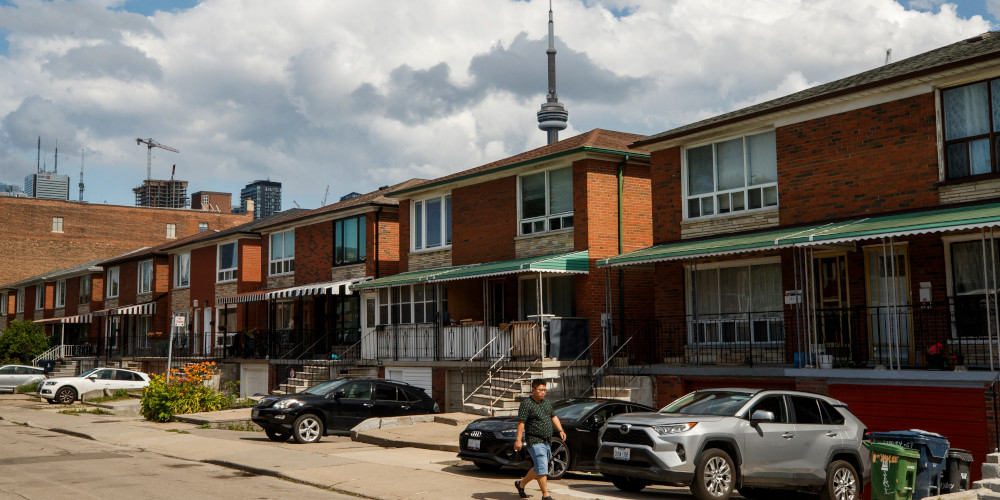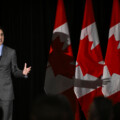
“Securing the promise of Canada is not only about creating jobs and keeping our air clean, it’s also about making sure that everyone has a real and fair chance at success. And given Canada’s strong population growth, that means solving the housing crisis.”
– Prime Minister Justin Trudeau, November 1, 2023 speech to the Ontario Economic Summit
Canada’s housing affordability crisis has risen from a young-person issue mostly concentrated in a small number of major cities to what federal Finance Minister Chrystia Freeland has recently called the “central challenge” facing the country. The prime minister is right to say that it strikes at the heart of the “promise of Canada.”
The magnitude of the crisis is now well-established:
- Over the past twenty years, Canadian home prices are up by more than 140 percent on a real basis. The average home price nationally increased by nearly 50 percent since the COVID-19 pandemic alone.
- Major cities such as Toronto and Vancouver are now among the least affordable in the world. Canada, as a whole, is home to the highest housing price-to-income ratio in the G-7 and the second highest in the OECD.
- National Bank estimates that the qualifying income required to buy a typical home in the Greater Toronto Area is roughly $225,000—which means that a family must be in the top ten percent of income earners to qualify for a typical mortgage in the GTA.
- RBC Economics similarly estimates that the share of income needed to cover the ownership costs in Vancouver is now 102.6 percent. The national average is more than 60 percent.
- Average rental prices in Canada have also seen a significant increase in recent years. The average one-bedroom apartment in Toronto and Vancouver is $2,800 and $2,590 respectively and for two-bedroom units, it is $3,370 in Toronto and $3,920 in Vancouver. To put that in perspective: the median after-tax income in Canada is about just under $69,000, so rent in these cities would represent between 55 and 70 percent of the median family’s or individual’s after-tax income.
The source of the crisis is rather straightforward: there’s a large gap between supply and demand that’s driven up prices and kept them elevated even as interest rates have gone up. The Canada Housing and Mortgage Corporation estimates that we need to add nearly 6 million new homes by 2030 to restore a semblance of affordability.

Yet if the source of the problem is clear, its underlying causes are far more complicated. It’s a multi-causal crisis with a number of contributing factors, including (in no particular order):
- An unprecedented low-interest rate environment for more than a decade that has put upward pressure on housing demand.
- Large-scale population growth driven by immigration—including permanent residences and non-permanent residences (such as students and temporary foreign workers)—that boosted the country’s population by 1.25 million in 2023 alone.
- Federal and provincial policies (such as subsidized mortgage insurance and various tax incentives) that have artificially increased housing demand.
- Local land use and zoning policies, as well as development fees, that have driven up the cost of housing construction and limited the growth of housing supply such that Canada is now home to the fewest homes per capita among G-7 countries.
- Provincial and local rent controls which are shown to constrain the supply of new units and similarly drive up prices.
This inexhaustive list of causes and effects is mostly limited to the market-based share of the housing market. Some might choose to interpret the housing crisis through the lens of inadequate social or First Nations housing or the so-called “financialization” of the residential housing sector.
The key point here is that while different people will undoubtedly understand the housing crisis and its causes in different terms, the fundamental problem is still the same: the Canadian housing market is marked by too much demand and too little supply.
In that sense, many of the differing interpretations about the causes of this inherent supply-demand gap may in fact be correct at the same time. It’s doubtless true that a combination of low interest rates, high population growth, and anti-development policies have contributed to the supply-demand gap at the heart of Canada’s housing affordability crisis.
The question before policymakers is: how best to address these interconnected issues and in turn bring supply and demand back into something approximating equilibrium in order to restore affordability? We’ll come back to that in a minute.
First, however, it’s worth returning to the prime minister’s recognition that we find ourselves in a “housing crisis.” He’s right of course. Canada’s housing affordability challenges have reached the level of national crisis for several reasons, including (in no particular order):
- Housing costs have become a huge financial burden for individual households, including contributing to unprecedented levels of household debt.
- There’s strong reason to believe, based on U.S. research, that high housing prices are distorting labour mobility (particularly to the country’s most productive cities) and, in turn, significantly reducing overall economic output.
- Evidence tells us that high housing prices are a key factor in delayed family formation and, in turn, a contributing factor to Canada’s declining fertility rates.
- Rising housing prices have distorted consumer spending and private investment away from more productive places and parts of the economy.
- Public optimism about the future for individuals and the country as a whole has fallen based in part on declining expectations about homeownership and the harsh realities of the affordability crisis.
- There’s a risk of growing intergenerational tensions and the possible erosion of social cohesion and political stability if we become trapped in a zero-sum conflict over housing.
These economic, social, and political costs of the housing affordability crisis are significant. They risk distorting Canada’s economy, its demography, and ultimately politics itself. The housing crisis is a “wicked problem” rooted in the supply-demand gap that now requires of our policymakers a proportionate policy response.
The focus and nature of such a policy response will necessarily differ based on the underlying cause that it’s aiming to address. Some may pursue land-use reforms in order to expedite and increase housing construction. Others may reform or eliminate housing subsidies in order to curb policy-induced housing demand. And there may be those who enact immigration reforms in order to bring population growth in line with housing supply. The list invariably goes on.

The key point is that we require serious policy action to address the multi-faceted causes behind Canada’s housing crisis. We must begin to close the gap between supply and demand. This starts with ideas.
That’s why we are pleased to launch year two of The Hunter Prize for Public Policy. The prize, generously supported by the Hunter Family Foundation, aims to shake up Canadian policymaking by marshalling fresh ideas, energy, and voices to take on a clearly-defined “wicked problem.”
Wicked problems, by the way, are policy issues or challenges that are difficult to solve for three reasons: (1) they involve interconnected economic, cultural, and social factors; (2) they tend to be long-term in nature; and (3) their possible solutions can be contentious due to entrenched thinking and interests.
Up to $50,000 in total prizes will be awarded each year to Canadians aged 40 and under for their innovative and practical policy ideas in response to a specific problem. The winning idea will ultimately be determined by an esteemed panel of judges. You can learn more about the prize here.
For this year’s prize, participants are tasked with the problem of addressing Canada’s housing affordability crisis. It’s indeed a “central challenge” facing the country that requires new voices and new ideas that transcend ideology, partisanship, and conventional wisdom. We couldn’t think of a better topic for this year’s Hunter Prize for Public Policy.
We end therefore where we started with the prime minister’s warning about the housing crisis and the threat it poses to the “promise of Canada.” As significant as the short-term economic costs of housing unaffordability are, it’s these long-term costs to our common aspirations and collective optimism that may ultimately be the most damaging.
It’s good therefore that our politicians are acknowledging the problem. But it’s not enough. We need practical ideas to solve it. The Hunter Prize for Public Policy intends to be part of the solution.
Recommended for You

The Notebook by Theo Argitis: Carney’s One Big Beautiful Tax Cut, and fresh budget lessons from the U.K.

Ginny Roth: How vacant liberal nationalism left Canada worse off than George Grant even imagined

Peter Menzies: Justin Trudeau’s legislative legacy is still haunting the Liberals

‘Our role is to ask uncomfortable questions’: The Full Press on why transgender issues are the third rail of Canadian journalism




